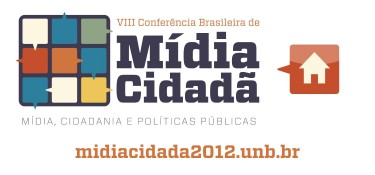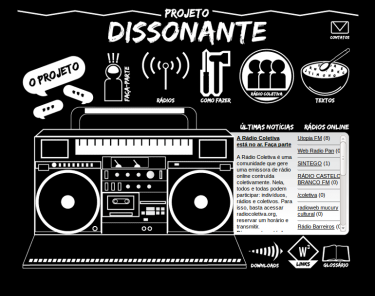All links lead to Portuguese language pages.
To explore topics on “Media, Citizenship, and Public Policies” is the invitation launched by the VIII Brazilian Citizen Media Conference to media professionals, investigators in this area, scholars, social movements members, civil society representatives, professors and students, who are gathered on September 24th and 25th, 2012 at Brasilia University to
debater temas relacionados ao direito à comunicação, a produção de conteúdo pela população, ao protagonismo da sociedade no processo comunicacional e a todos os elementos que compõem a mídia cidadã. Além do debate, o encontro busca promover o diálogo e o intercâmbio entre as pesquisas acadêmicas e as experiências inovadoras da sociedade civil de produção de mídia que enfatizem uma prática cidadã.

VIII Brazilian Citizen Media Conference. Media, Citizenship, and Public Policies. Twitter: @midiacidada2012
Searching to understand “how the media helps to construct and deconstruct social mobilization”, questions will be addressed regarding communication, health, education, and human rights, with a more general scope of this session of the conference – Media, Citizenship, and Public Policies – and with special emphasis on research, media and citizenship practices in Latin America.
The extensive debate program, round tables and workshops, especially rich in work groups, also include the participation of Global Voices contributors, Elisa Thiago and João Miguel Lima [en].
On the first day, September 24th, João Miguel spoke on the “construction of online citizen media coverage” through the case study of the special page launched in 2011 by Global Voices in Portuguese, the Belo Monte Dossier. The presentation was held in a work group dedicated to the theme “Journalistic practice and the (des)respect towards the citizen,” where more was talked about Belo Monte and its “social invisibility in media discourse,” by Josiele Souza, as well as “local telejournalism” and TV Guairacá, in Brazilian state Paraná, by Ariana Pereira and Luciana Grande, and radio community projects.
On 25th, Elisa Thiago is addressing “Digital Activism and Citizen Media” under the transnational perspective of Global Voices, in a session dedicated to “Considerations about communication and citizenship in the Latin American context.” The list of speakers includes Tabita Strassburger, on “the Latin American context and the media experience of TeleSUR website,” Rodrigo Braz and “the conception of communication public service in Venezuela,” that also brings a proposal from Mariana Holando to a “Broadcasting Service in Brazil and Accountability.” Rayza Sarmento will speak about “conflict discourse in the media as political opportunity for social movements.”
All the sessions can be followed on Facebook and Twitter (@midiacidada2012) through the hashtag #MidiaCidada2012.
Video and experiences in parallel
In parallel, there will be a Citizen Video Exhibition with different formats and narrative approaches about citizen media experiences, produced by the Citizen Media Brazilian Network.
“Enxergando o Invisível” (Seeing the invisible), by Patricia Banuth, is a documentary project about visually impaired and an audio description on how to use accessibility and digital inclusion. Marconi Araújo wrote about the film in his blog:
Filmes para cegos ou deficientes visuais? Tal expressão pode causar, no mínimo, estranheza a quem nunca ouviu falar da audiodescrição em cinema, recurso que permite a tradução verbal de cenários e aspectos visuais dos filmes, o que propicia levar a experiência da sétima arte a todo um segmento da população portadora daquela deficiência.
Also to be screened are”Entre Vãos“, by Luiza Caetano, about the remaining quilombola community Kalunga Vão das Almas, “Por longos dias“, by Mauro Giuntini, with texto from the Nobel laureate of lusophone litrature José Saramago about the Movimento Sem Terra in Brazil, and “Dom Helder, o Santo rebelde,” by Erika Bauer.
The Innovative Experiences in Citizen Media Fair also illustrates current and different practices of media and citizenship in Brazil.

The Rádio Dissonante project will organize a workshop on the creation and maintenance of online radio collective. Dissonante.org
There will be presentations of the Informativo Fábrica de Imagens (@FabricaImagens), from Fortaleza, dedicated to genre issues, sexual diversity and youth, and the independent communication project Vírus Planetário Magazine (@VirusPlanetario), comprising graduates, students and academics to discuss politics, culture and media, created in Rio de Janeiro.
The Vila Embratel TV (@TVVilaEmbratel) also will be present with its project of social inclusion that connects Universidade Federal do Maranhão with teenagers from the community to produce content for an online TV channel that “shows positive aspects of neighborhood, usually portrayed in traditional media in a negative way.”






